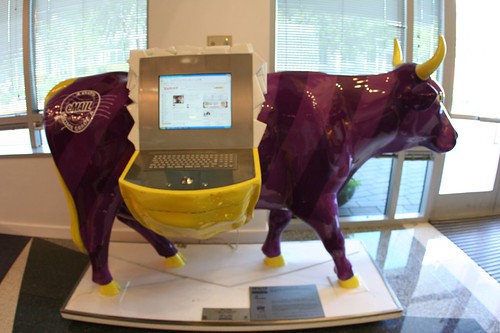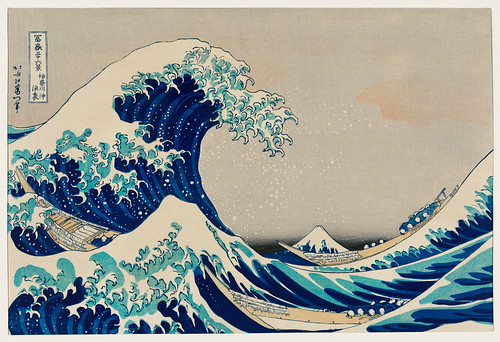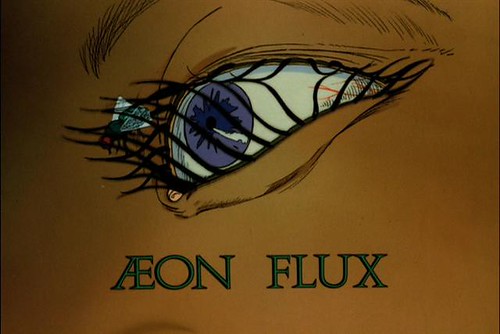I was started down the train of thought to think about the idea of a cyborg based on a discussion with my colleague Colleen with regards to the changes we had been seeing in consumer behaviour. With that in mind I thought I would reflect on what my understanding of what cyborgs are.
Cyborg in culture
I can just about remember playing with friends bionic man toys and primary school and remember the opening credits of The Six Million Dollar Man. The show ran from 1973 to 1978 and had a corresponding spin-off show called The Bionic Woman.
According to the show a cyborg was:
CY’BORG
A HUMAN BEING WHOSE ORIGINAL HUMAN PARTS HAVE HAD TO BE REPLACED TO ONE EXTENT OR ANOTHER BY MACHINES THAT PERFORM THE SAME FUNCTIONS.
According to the definition, at the time of writing my Dad is a cyborg, having had a pacemaker fitted a year or two ago. So would the character Batou be in Ghost In The Shell.
Or Geordi La Forge in Star Trek Next Generation.
The cyborg was a feature of cyberpunk culture. The key difference was that people chose to have augmentation, not just as a repair but as a form of enhancement.
Optional enhancement
Johnny Mnemonic had a storage brain interface fitted that allowed him to be a giant walking thumb drive as a profession.
Fellow William Gibson creation Molly Millions has retractable razor sharp blades in her fingers and an augmented metabolic system. She has permanently fitted mirrored lens over her eyes that enhance her vision.
Captain Cyborg
Real life did a rather poor version of this cyberpunk fantasy with academic Kevin Warwick spoofed by IT paper The Register using the moniker Captain Cyborg for him. He did foolish things like implant himself with an RFID chip usually used for pet identification. And yes of course Warwick did a TED talk. I can’t tell whether the audience is laughing with him; or at him.
So what has an office conversation got to do with a cyborg?
Digital drugs
Which brings me to how an office conversation spurred me to reflect on how a conversation on compulsive behaviour got me to start thinking about cyborgs. Culture did envisage some form of device addiction. The premise of Neal Stephenson’s novel Snow Crash revolves around a file that crashes a person’s computer and leaves a hacker called Raven with real-world brain damage in the process.
Long live the new flesh
Ten years earlier Videodrome featured a TV executive called Max Renn investigating a satellite TV show called Videodrome. It is described a socio-political battleground in which a war is being fought to control the minds of the North American population. Built into it is a signal that produces a malignant brain tumour. Renn’s reality dissolves over the rest of the film as he finds out more and then kills himself.
There is a clear analogy with the heroin and crack cocaine epidemics that ravaged the cities of the western world through 1980s and 1990s as drugs of desperation in the face of globalisation. Science fiction is as much about the past and the present rather than the future. Heroin and crack both cost large amounts of money, so children tended to be secondary and tertiary victims rather than addicts in their own right. It would also be problematic for the authors to contemplate gratuitous harm to children in their works back then, let alone now in more anxious times.
In both Snow Crash and Videodrome users suffer damage from technology that they are unwilling to put aside.
Back to now
Addiction is ‘real’
My colleague put forward the following points:
- Screens now dominate our lives, and their presence is only getting stronger and more powerful
- (Some) adults can control to a certain extent how often and when they use screens. But there is a commonplace screen addiction.
- Smartphone addiction and drug addiction share some similarities including a neglected personal life, a pre-occupation with the subject of the addiction, social media as a mood modifier or for escapism. The implication is that smartphones are an unwilling appendage which add capabilities (some of which are of a questionable value) and can’t be put down. All of which reminded me of my childhood (and adult relationship with music). But it is why I started to thinking about the nature of a cyborg
Smartphone addiction
Smartphone addiction goes by many names including screen addiction, online or internet addiction. Japan identified the phenomenon of hikikomori. The term was coined by social scientist Tomaki Saito in a 1998 book. While the term itself meant socially withdrawn, it hinged around the person staying home and playing video games or living a virtual life.
By 2015, academic research indicated that somewhere between 1.9 – 2.5 percent of Hong Kongers aged from 12 to 29 might fall into the hikikomori category, compared to the 1.5 percent of Japanese believed to in the category.
Meanwhile in the early 2000s BlackBerry email devices were nicknamed Crackberry, often by users who admitted overusing them in anti-social contexts. There was a corresponding term ‘BlackBerry orphans‘ for children who were ignored by parents wrapped up in their BlackBerry writing and reading emails instead of engaging at home.
China was the first country to push for action to clamp down on children’s online time, in particular the use of online games. As far back as autumn 2005, China’s General Administration of Press and Publication had started trialling a fatigue system to limit screen time.
By 2007, the local government of Shanghai had a camp set up to help cure teens of internet addiction working with a pilot bunch of inmate aged between 14 and 22. And just a year later the FT was documenting how the Chinese government was struggling to combat the addiction throughout the country. This addiction implies a cyborg-like relationship with their internet access device.
In 2017, the substitute phone is launched as a kind of fidget tool. This provides the tactile experience of swiping and button pressing, but without any of the compelling addictive software.
By 2018, smartphone manufacturers were worried about smartphone addiction and came up with different ways to try and give their customers better information and control over their smartphone usage.
What about the children?
My colleague asked the following question: given the impact on adults, who haven’t grown up with screens, what does this all mean for children?
Remember the BlackBerry orphans earlier? My colleague proposed that now children are being taught once they are born that screens and smartphones are at the centre of life, rather than people. Parents use their smartphone as a substitute to toys, parent-child playtime or conversation or even reading to the child.
This is claimed to manifest in impacted social and emotional development. Expert opinion is that children below 2 years old shouldn’t have any ‘technology in their life‘.
There is a belief amongst experts that screen time can result in permanent damage to developing child’s brains impacting concentration, social kills and vocabulary. Some even believe that there might be a link between ADHD and TikTok.
But the Royal College of Paediatrics and Child Health (RCPCH), the UK’s professional body most concerned with a child’s health, doesn’t publish any recommendations. There isn’t any research to indicate the ‘safe’ level and arguably commissioning this research would likely pose ethical questions.
By the time children enter secondary education, they are likely to own a smartphone of some sort. They maybe exhibiting a number of physiological effects:
- ‘Text neck’
- Premature eye ageing
- Sleepless nights
Admittedly, as a child I was told that reading after lights out and listening to the radio or watching TV in the dark would result in ‘going blind’ or a lack of much needed sleep.
Like television before it, online screen time adversely affects academic performance. My own exam grades were empirical evidence of this. China, South Korea and Taiwan both have different ways of limiting screen time. China has enabled technology with online games platforms. Taiwan has held the parents directly responsible and even fines them.
Questions
All of this prompted a number of questions with me:
- Is it the device or is it the media?
- Is it different to other waves of technology?
Moral panics – or what can we learn from the past & our cyborg future
Media
- Rock music – academic research indicated that listening to rock music was linked to an increase of reckless behaviour including drug use, unprotected sex, casual sex, drunk driving, speeding and vandalism
- Violent content – while violent content was considered to trigger a response in children, the overall risk associated with it was difficult to prove conclusively despite decades of research. Studies as far back as the mid 1990s indicated that there a lot of other factors to consider in addition to the exposure including mental health and cognitive ability.
- Sexual content – the US Center for Media Literacy pulled together views on sexual violence in content. There wasn’t a lot of clarity in the plurality of views beyond the challenge of defining content to be of an overly sexual nature. What views were expressed were not backed by scientific research
- Video gaming – because of the strategies used by players in video games. Academic research in 2015 indicated that video games might have a negative impact on brain development over time.
Devices
- Personal stereos – the use of a Sony Walkman and later on the iPod was considered to a negative effect on hearing. They were also considered to have a social effect, depending who you ask it considered to be empowering or dislocating from society with increased narcissism. The positive autonomy based interpretation was called the ‘Walkman effect‘. The implication from this research is that not giving a child a smartphone at a certain point could have a detrimental effect on them – at some point the child has to become a smartphone | human cyborg.
- Televisions – when I was a child I was constantly told to not sit too close to the television and that doing so would cause me to go blind. According to Scientific American, it isn’t the distance from the television that affects the child, but a long enough amount can cause eye strain.
The implication in past concerns about media and devices is that its the content that tends to do the damage rather than the device. This tends to indicate where action should be taken on ‘screen addiction’. As for our great cyborg future – it can’t be stopped.




